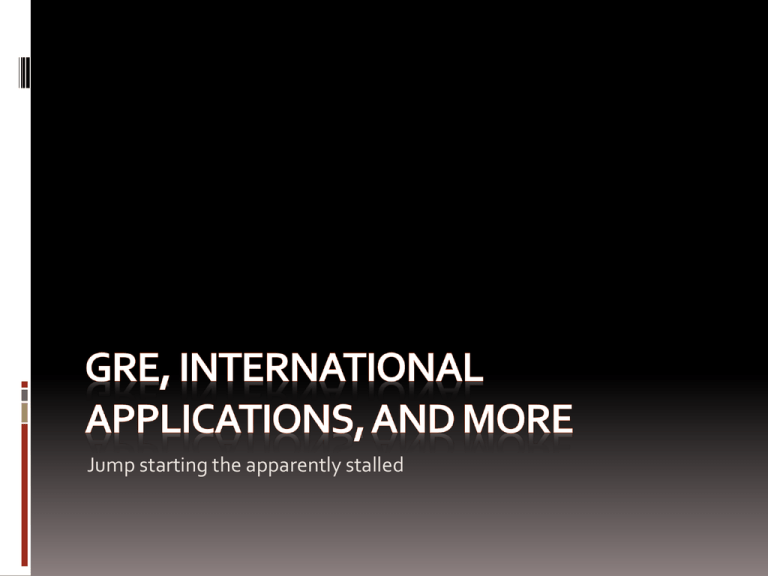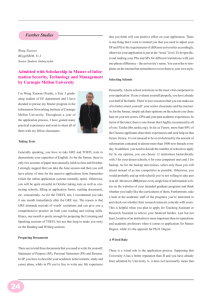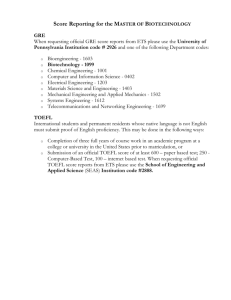Microsoft Power Point GRE, InternationalApplications
advertisement

Jump starting the apparently stalled Why we are here Internal Applications are a complicated process (specially if you are new to it) The need is to have a self sustaining ecosystem amongst the students where knowledge about International Applications is shared This seminar is an attempt to jumpstart this (mutual) system of knowledge sharing Slides will be sent at the end of seminar. Do share with friends and reach out to faculty if you have questions. Introductions? The process of applying for higher education isn’t an exact science. Everyone chips in with their experiences and lessons. In the context of the topic, it makes sense to know the speakers background. Speakers: Shahid Razzaq Syed Akbar Mehdi Do you need to go for higher education? Questions you should ask yourself: How was your Bachelors experience? Can you afford higher education at the moment? (education abroad can be expensive) Do you feel the need for getting practical experience instead? … perhaps a job after undergraduate will give you more clarity on priorities. Requirements of International Applications Stuff you will need: Transcripts Letters of Recommendation Statement of Purpose (SOP, also called Personnel Statement) GRE Test Scores TOEFL Test Scores Resume/CV Application Fees Transcripts and Resume Transcripts: Show how strong you are academically. GPA CAN MATTER! Some universities have a minimum GPA limit for applications Resume/CV: It allows you to supplement your transcript You can prove the practical side of learning. If your GPA isn’t very high, then a strong Resume with lots of interesting projects would help. Final Year Project is critical and MUST be mentioned Choose your FYP cleverly. If you intend to go for masters, perhaps a more research oriented FYP would be good. Letters of Recommendation & Statement of Purpose Letters of Recommendation: Normally 3 letters required. Written by trust worthy people (read professors/senior managers) and not your peers/friends. Strong letters are a must. Statement of Purpose: Your own personnel statement (normally 1-2 pages in length) on why you want to join the particular department/college/university. It’s a good idea to look at a sample SOP, but you must write your own. Should include the following: Your areas of interest and your motivations for the application. Professor on the target university/school who you think aligns with your interest area. Prior introduction/collaboration with the said Professor is a good idea and will help boost your chances. Graduate Record Examination (GRE) Don’t be scared of it! Computer Based/Adaptive Organization of Test: Quantitative (800) Verbal (800) Analytical Writing (6) General Score requirements for Tier 1/2/3 Universities Number of times you give your GREs (history of scores is visible to universities) Cancelling GRE tests (you wouldn’t get to know your scores, but universities will know you tried giving the test) GRE Subject Graduate Record Examination (GRE) – How to prepare Give ample time for preparation 3-5 months, best done during summer breaks GRE Power Prep software for practice & benchmarking (downloadable from GREs website) Other software: GRE Bible/… Verbal Section: High Frequency wordlist (learn 1000 words at the minimum) Quantitative Section: Practice High School Mathematics Analytical Writing: Not much you can do in a short time. Practice with sample topics. See marked examples of essays to and their critique. Know the Code Number for the Universities you are applying TOEFL –Test of English as Foreign Language Piece of cake for most people Those students coming from rural areas might want to take this more seriously Basically geared towards testing whether you understand the English language. Mandatory for International Applicants from non-English origin countries. For Internet Based TOEFL, marks are generally out of 120. Decent score: 100+ ? TOEFL is valid for 2 years Best to take TOEFL at the end so that (for your purpose) it remains valid longer Know the Code Number for the Universities you are applying Selecting the Region Regions: USA Europe Far East (Korea, Singapore, China …) Australia And more … Criteria for selecting Region: General ranking of universities in the region Universities in a region generally share requirements on International Applications (that is you guys!) Funding/Scholarships are a factor Duration of studies Look ahead: Do you think you might extend your MS into a PhD? Statistical probability on getting Student Visa for the region? Selecting Universities Ranking US Universities: US News, WorldReport World Ranking: Times Higher Education Ranking are based on Area: Engineering vs. Law vs. Medical etc so make sure you are looking at the right ranking The 3-5-2 Rule: 3 Universities above your ‘level’, 5 at level, and 2 below level. Say your level is same as around 25th Ranked Unviersity (Tier 2). Apply to 3 universities of tier-1, 5 universities of tier-2 and 2 universities of tier-3 (assumes you apply to 10 universities). Expenditure per anum Tuition + Boarding + extra Application Deadlines Regular Admissions: There is a application submission date. All applications have to be submitted before this time. The admission committee then sits down and selects students. This is what is generally followed by universities in the US. Rolling Admissions The admissions committee keeps reviewing applications as they come in. When they have selected enough applicants, the admission stops. Not very common in the engineering discipline in the US. Timelines What timeline should you follow for preparing and applying for admissions? US Universities: For post graduate admissions in the US the deadlines are generally in November – February timeframe. This is when applying for the Fall Semester. Some universities do take international applications for Spring Semester. Expect to hear back around Feb/March. Semester starts Fall of that year Approximate Timeline for US Universities GRE Prep Start Mark Progress Regularly with Sample Tests (Powerprep) July Aug Finalize University Choice Register for GRE Test Start working on SOP Ask Recommenders for LOR Sept Oct Application Deadline! GRE Test Date Nov Dec Finish TOEFL Register Request LOR Work Finish Test Date for TOEFL Transcripts SOP Work Q&A





